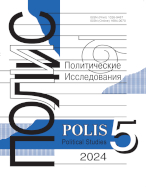Violence and Freedom in the Political Context
DOI: 10.17976/jpps/2004.03.10
Mezhuyev V.M. Violence and Freedom in the Political Context . – Polis. Political Studies. 2004. No. 3. https://doi.org/10.17976/jpps/2004.03.10
The article has for its subject critical analysis of the conception of political violence, formulated in a number of recently published works by B.G.Kapustin (see, e.g., Polis, 2003, № 6).While recognizing B.G.Kapustin's reasoning on dominating role of violence in politics as practically irreproachable from the empirical viewpoint, the author is, nevertheless, convinced that political philosophy ought to refuse regarding politics as sphere of violence. An interpretation going as far back to, as the antiquity epoch, seems to him more adequate: it is the interpretation of politics as sphere of freedom, with civil consensus, dialogue, and joint consideration of all socially significant issues assumed as a basis of the said freedom. Rating as politics what lends itself to empirical observation in real history, he holds, is permissible for a political scientist, but by no means for a philosopher. The latter, in the author's opinion, should seek to comprehend the sense of politics in the general context of man's vital activity, to find out the ideal which justifies, makes sensible the very existence of politics, for that is the only possible way to conceive politics in at least a minimally reasonable historical perspective.
See also:
Magun A.V.,
New Nomos of Earth (Carl Schmitt as Diagnostician of Modern Crisis in World Politics). – Polis. Political Studies. 2003. No2
Yerokhov I.A.,
On Possibility of Political Morals. – Polis. Political Studies. 2002. No4
Sulimov K.A.,
Politico-Philosophical Conception of Political Violence: the Search after Sense. – Polis. Political Studies. 2004. No3
Ilyinskaya S.G.,
Toleration and Political Violence. – Polis. Political Studies. 2004. No3
Fyodorova M.M.,
Metamorphoses of the “Free Individual” (Notes on the Formation of the Problem Field of Political Philosophy in the 19th Century). – Polis. Political Studies. 2003. No5





.jpg)






 print
print
.jpg)
.jpg)